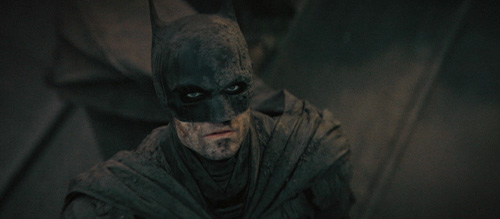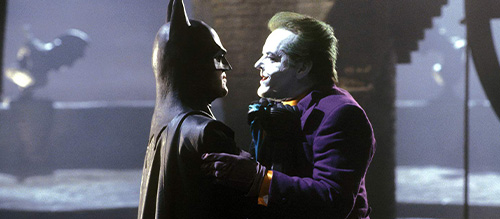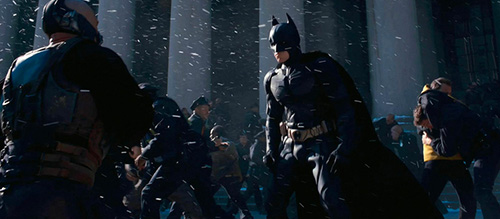Live-Action Batman Movies Ranked
5. Batman (1989)
One of the most important superhero films of all time, Batman (1989) proved that superhero cinema could succeed beyond the world of Superman, opening eyes to a whole new world of what would come to be the superhero genre we know and love today.
Tim Burton’s Batman was only the director’s third feature-length directorial effort following Pee-Wee’s Big Adventure (1985) and Beetlejuice (1988), but the darker and more gothic sensibilities the director had proven through both titles made him the perfect match for a new, darker take on Batman. In many ways, Batman (1989) is Burton’s own unique vision put to film, though in casting Michael Keaton (with whom he’d teamed on Beetlejuice) as Batman and the iconic Jack Nicholson as his chief antagonist Joker, Batman (1989) became the stuff of myth and legend, the kind of iconic superhero film that even people who don’t know about superhero films have heard about.
Elements of this Batman are way more dated than those of the Nolan trilogy and some elements are a little less than the extraordinary standard on offer in Nolan’s work, hence its ranking in this list, but this 1989 film remains a classic nonetheless, a genre-defining entry from one of the leading franchises of superhero cinema.
Recommended for you: Live-Action Jokers Ranked
4. The Dark Knight Rises (2012)
The conclusion of Christopher Nolan’s Batman-defining trilogy, The Dark Knight Rises, wrapped up the threads of the previous two films to offer satisfying narrative conclusions to the majority of the Dark Knight Trilogy’s central characters, the director laying on the “blockbuster” aspect of his thriller-action-blockbuster series more-so than in his previous two movies.
As with any run-of-the-mill blockbuster The Dark Knight Rises features a number of narrative conveniences, especially throughout the final act in which a number of deus ex machinas offer simple solutions to deep problems, and yet by traditional blockbuster standards there seems to be a real lack of high-octane action, even with the continuous threat of a nuclear bomb ticking ever-closer to explosion as the film sprints towards its finale.
Even so, fans of Christopher Nolan’s other work will see his philosophies on perspective and time present here, and Batman fans get to see a number of the franchise’s more iconic characters get some of their best silver screen representations, while those invested in the Dark Knight Trilogy will no doubt find immense satisfaction in seeing Gotham finally prove that it is worth saving, in seeing Bruce Wayne finally understanding that his city no longer needs him, in coming to understand how the small acts of Gotham’s citizens are ultimately what guide their city out of darkness.
With IMAX photography, a Hans Zimmer score, Nolan’s traditional studio philosophies, and two whole films feeding into it, The Dark Knight Rises is a satisfying conclusion to arguably the greatest superhero trilogy of all time, and goes immensely underappreciated in the annals of comic book movie history as a result.
3. The Batman (2022)

For all of the hints of investigative skills on display across the Batman franchise, not a single live-action film had made mystery and investigation so integral to their plot as 2022’s The Batman. This was less Caped Crusader or Dark Knight, and more World’s Greatest Detective.
Directed and co-written by Matt Reeves (Dawn of the Planet of the Apes), The Batman was a mood-driven mystery-thriller that had more in common with Film Noir than the superhero films of the day, and it appropriately engulfed Bruce Wayne and the Batman in a cityscape that felt damp, dark, and dirty. Reeves used the duality of water as a force of both destruction and cleansing to mirror the duality of Bruce Wayne/Batman in such a manner that the very setting itself spoke of this Batman’s journey; one that sought to transition a grief-ridden but somewhat sheltered young man from the privilege of his heritage and towards a self-enlightenment that spoke of his increased self-worth. Perhaps more vitally as regards the central hero’s presentation, Reeves and company sought to place more emphasis on the choice of their Batman to be brave, rather than presenting him as a reactionary force against antagonistic action, sewing fresh seeds for their silver screen iteration that made for a unique version of a familiar character that acted more as an audience surrogate than otherworldly presence for perhaps the first time.
Though The Batman arguably suffered a second act lull courtesy of tangential plot elements seemingly included to serve recognisable supporting characters more than the central premise of the film, and though it did sit at a bloated 2 hours and 56 minutes (the longest in Batman’s live-action film history), Matt Reeves and Oscar-winning cinematographer Greig Fraser shot the film in a uniquely cinematic manner reminiscent of great 70s films like Taxi Driver and one of this film’s clear inspirations, 1995’s Se7en, to bring to life a rich script through one of the franchise’s most unique visual presentations yet.



